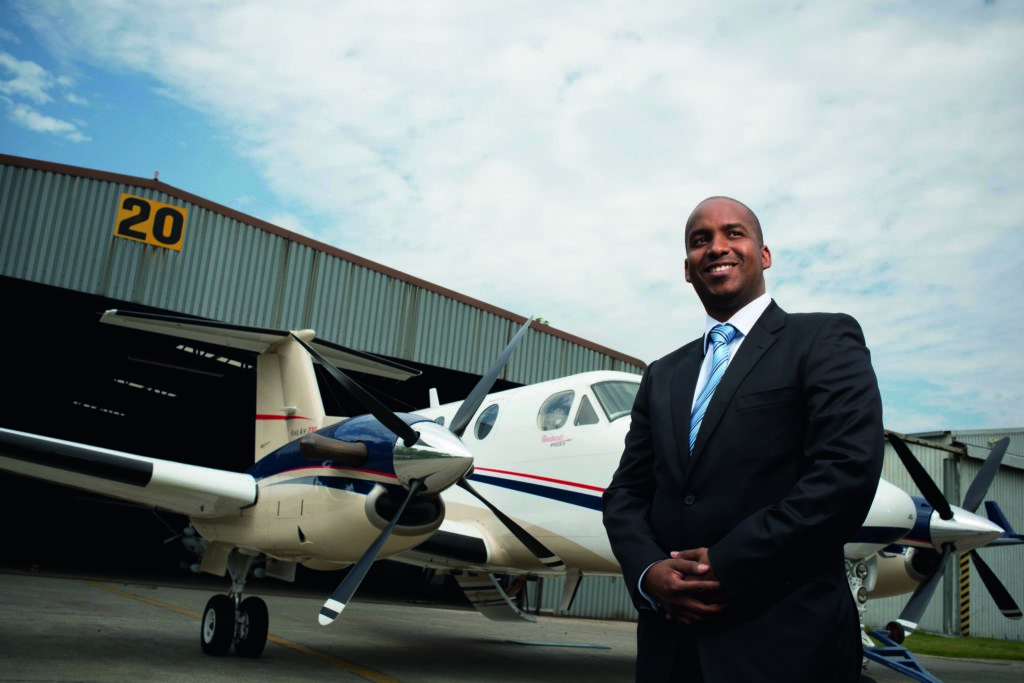Legend has it that heavyweight champion Muhammad Ali was flying into the newly independent Ghana in the 1960s, when he went into the cockpit and saw two black pilots.
“What did you do with the real pilots?” asked Ali.
“We are the real pilots,” one of them replied.
“Back home in Louisville, Kentucky, they don’t let black people drive a bus,” quipped Ali.
When Ernest Kekana was a young boy in South Africa, fascinated with flying, this picture hadn’t changed much.
“I didn’t necessarily want to be a career pilot but wanted to fly airplanes, and the type of airplanes I wanted to fly was obviously anything I could get my hands on, the bigger the better. In order to fly the bigger airplanes, I knew that I would have to pursue a career in aviation as a pilot,” he says.
Kekana saved up the money he made from working at Edgars, a South African clothing retail chain, to attend a flight school in Lanseria Airport. But he quickly learned that if he wanted to succeed he would have to fly more often. He gave up his part-time managerial position at Edgars for a weekend job at the flight school for a tenth of the money.
“This was my opportunity to get my foot in the door in aviation… It’s one of those close-knit industries, and unless you have your foot in somewhere, it’s going to be difficult to actually break into it.”
When one of the operation controllers from the flight school’s charter division took leave, they needed someone to fill in and Kekana grabbed the controls with both hands.
“It was supposed to be a three-month contract but after the first month they offered me a permanent position,” he says.
At the time, Kekana had his private pilot’s license but could no longer afford to continue his training. He remained working at the flight school on weekends and went to work on charter during the week. He flew charter flights and occasionally sat in as co-pilot to build up his flying hours.
After two years in the charter business he was promoted to senior flight operations controller.
One of the managers at the flight school applied to the Aviation Training and Development Foundation to sponsor Kekana in the final phase of his training. Although Kekana had almost finished paying his way through flight school, the non-profit organization was adamant that he join them. They were looking for a role model to promote aviation among black people.
Kekana then worked for SA Express for two years and then South African Airways for five years, where his dream for his future took shape.
“I [had] arrived in terms of what you can achieve as a career pilot for an international carrier. My first conversion was onto a Boeing 747 as the inflight relief pilot so I was already flying 360-seater airplanes on long-range international flights… From there you just move in the ranks but the airplane and the routes and the types of flying you do will not change for the next 30 to 40 years… I thought, ‘We’re here,’ there must be more that I can do or give back.”
This led to the birth of Kekana’s luxury charter service, K5 Aviation. It is one of the only South African aviation companies with international and domestic licenses for all categories of aircraft and helicopters.
Starting an aviation company wasn’t easy. Kekana chuckles as he tells the story of how he got his service license.
Kekana had approached the international and domestic air services in South Africa to apply for his license. His international license was approved but the domestic air service license was rejected. He says the domestic air service wanted to see more money in the bank and more financial security. K5 then approached the Umsobomvu Youth Fund, now known as the National Youth Development Agency, which offered the funding. After that, the air domestic council approved the license.
“The domestic and international councils are independent bodies. The perceived more stringent council had approved my application and given us the license and the domestic hadn’t, it was a bit of a surprise,” says Kekana.
After they got their finances in order, K5 Aviation took off in 2006, and within the first six months they were making a profit.
“After 12 months we were showing a loss,” says Kekana.
Their worst financial period came during the 2010/11 recession. The company went from having weekly flights to receiving no phone calls. The team had to negotiate with their debtors and creditors.
“We’re still standing. We’ve made money, we’ve lost money but we’ve managed to stick it out through the recession and our doors are still open.”
Despite the difficulties—other airlines suffer too—Kekana is confident about the future of the K5 team. He says they would like to fly larger groups of people more regularly.
The advice Kekana gives to emerging entrepreneurs is the same advice he takes.
“Everything is achievable, if you really want something and you work hard towards it you will get it […] If one day, this all shuts down, if I can come on a weekend and take a little flight school airplane and go for a flight around the city, I’ll be happy because I’ll still be in an airplane.” FL
